|
|
|
Sort Order |
|
|
|
Items / Page
|
|
|
|
|
|
|
| Srl | Item |
| 1 |
ID:
132627


|
|
|
|
|
| Publication |
2014.
|
| Summary/Abstract |
Within the last twenty years, China has become dependent on import of coal, oil and natural gas. Especially oil is now an economic and a security concern by the Chinese regime and key international stakeholders. Until 2035, China will account for one fourth of the global net growth in global gas consumption and more than half of the net growth in oil consumption. The future demand cannot be covered by China×s own conventional and unconventional sources. Pipelines from neighboring countries can cover more than half of the needed import of natural gas by 2030, but only 10 percent of the import demand of oil is secured so far. Even if China attempts to address its insufficient supply of oil by increased investments in overseas oil fields, there is still a large gap. Furthermore, the oil import will largely come from politically unstable countries and regions, and the bulk of the supplies must be shipped through the potentially insecure Hormuz and Malacca Straits. The ongoing territorial disputes with neighboring countries regarding areas with gas and oil reserves in contested waters bear evidence to regional conflict potentials, and China appears to engage more actively in energy diplomacy and regional cooperation.
|
|
|
|
|
|
|
|
|
|
|
|
|
|
|
|
| 2 |
ID:
132737
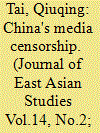

|
|
|
|
|
| Publication |
2014.
|
| Summary/Abstract |
Media censorship is the hallmark of authoritarian regimes, but much of the motivation and practices of autocratic media censorship still remain opaque to the public. Using a dataset of 1,403 secret censorship directives issued by the Chinese propaganda apparatus, I examine the censorship practices in contemporary China. My findings suggest that the Chinese Communist Party (CCP) is gradually adjusting its censorship practices from restricting unfavorable reports to a strategy of "conditional public opinion guidance." Over the years, the propaganda apparatus has banned fewer reports but guided more of them. However, this softer approach of regulating news is not equally enforced on every report or by different censorship authorities. First, the party tends to ban news that directly threatens the legitimacy of the regime. In addition, due to the speed with which news and photographs can be posted online, the authorities that regulate news on the Internet are more likely to ban unfavorable reports, compared with authorities that regulate slower-moving traditional media. Lastly, local leaders seeking promotions have more incentive to hide negative news within their jurisdictions than their central-level counterparts, who use media to identify misconduct among their local subordinates. Taken together, these characteristics create a strong but fragmented system of media regulation in contemporary China.
|
|
|
|
|
|
|
|
|
|
|
|
|
|
|
|
| 3 |
ID:
129261
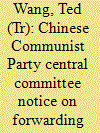

|
|
|
|
|
| Publication |
2012.
|
| Summary/Abstract |
To the Xinjiang Autonomous Region Party Committee and the party committees of all provinces, municipalities, and autonomous regions; the party committees of all large military districts, provincial military districts, and field armies; all central ministries and commissions; the party committees of various ministries and commissions of state organs; all general headquarters of military commissions; the party committees of all services of the armed forces; and the party committees of all people'sorganizations:The "Central Secretariat Summary of Discussions on Work Issues inXinjiang"1is hereby issued to you. Please implement it and carry it out in connection with actual circumstances. This document is simultaneously issued to the Party committees of all provinces, municipalities, and autonomous regions for reference. On the morning of July 6, 1981, issues in the work in Xinjiang were once again discussed in accordance with the Resolutions on a Number of Historical Questions in the Party since the Founding of the People's Republic passed by the Sixth Plenary Session of the Eleventh Party
|
|
|
|
|
|
|
|
|
|
|
|
|
|
|
|
| 4 |
ID:
139956


|
|
|
|
|
| Summary/Abstract |
In March, David Shambaugh, a professor at George Washington University, wrote a major essay for the Wall Street Journal titled “The Coming Chinese Crackup.” Shambaugh’s main point was that “the endgame of Chinese communist rule has now begun . . . and it has progressed further than many think.” Shambaugh admits that his view is not universally accepted, but the fact that a scholar of his reputation has reached this conclusion is significant.
|
|
|
|
|
|
|
|
|
|
|
|
|
|
|
|
| 5 |
ID:
133810
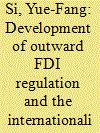

|
|
|
|
|
| Publication |
2014.
|
| Summary/Abstract |
The Investment Development Path (IDP) model has been widely accepted for illustrating the relationship between the inward and outward foreign direct investment (FDI) positions of a country and its economic status based on the data from developed economies. In recent years, however, outward FDI from developing economies has increased dramatically and it has been argued that institutions are 'forefront' factors in addition to the economic index. In this article, we use statistical data from China, which has gone through dramatic regulation reform and FDI development, to test the validity of the IDP model. We also trace the history of Chinese FDI regulation development to answer the following question: in what way are regulations important for FDI in different periods? We use Lenovo as a case study to show how a Chinese firm 'avoids' and 'adapts to' regulation changes. We find that the FDI development of China still follows the IDP model; however, the Chinese government has accelerated the whole process through active regulation reform. In a transition economy such as China, FDI co-evolves with the regulation, and the firms which can influence or foresee the policy changes can prosper considerably.
|
|
|
|
|
|
|
|
|
|
|
|
|
|
|
|
| 6 |
ID:
129268
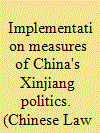

|
|
|
|
|
| Publication |
2012.
|
| Summary/Abstract |
This issue is a collection of twelve documents on the policies in Xinjiang. These policies can be grouped into four categories: economic inducements, ideological indoctrination, cultural assimilation, and social control. Economic inducements are provided on the assumption that economic growth will benefit the ethnic minorities. Satisfied materially, their tendency to resist is weakened. Ideological indoctrination has the power to cultivate political identification with the regime of China through an official narrative of historical view and the contribution of the regime to the economic and social development of Xinjiang. Cultural assimilation is to integrate Uighurs culturally with the Han-dominated Chinese culture through education. Social control is to establish a coercive system for preventing subversion and punishing the secessionists in order to weaken the will to resist.
|
|
|
|
|
|
|
|
|
|
|
|
|
|
|
|
| 7 |
ID:
129292
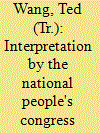

|
|
|
|
|
| Publication |
2012.
|
| Summary/Abstract |
The article focuses on the interpretation of the Basic Law of the Macao Special Administrative Region of China's Article 7 of Annex 1 and Article 3 of Annex 2. It cites the decision of the National People's Congress (NPC) Standing Committee that amendments must be made with the recommendation of a majority of the Legislative Council members. It adds that the amendments will only take effect if they pass various procedures approved by the Standing Committee.
|
|
|
|
|
|
|
|
|
|
|
|
|
|
|
|
| 8 |
ID:
129262


|
|
|
|
|
| Publication |
2012.
|
| Summary/Abstract |
To the Government of the Xinjiang Autonomous Region: The Summary of Discussions on the Work of Opening Up Xinjiang has been perused and approved by Comrade Gu Mu. In line with the opinions of leading comrades, it is hereby printed and issued to you. Please study it and carry it out. Ever since the third plenary session of the eleventh party congress, Xinjiang has been politically stable and united and economic construction has developed rapidly. The industrial and agricultural gross output value of 1986 has more than doubled that of 1980. Agriculture and animal husbandry have had bumper harvests for ten consecutive years, and the region is more than self-sufficient in cereals, cotton, oil, and sugar crops. Import trade, use of foreign currency, and the tourist business have made significant progress. Airline and railway communications and transport conditions have seen constant improvement. Xinjiang has abundant resources and a vast, sparsely populated territory and has great potential for developing the economy and supporting national construction.
|
|
|
|
|
|
|
|
|
|
|
|
|
|
|
|
| 9 |
ID:
133032
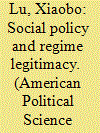

|
|
|
|
|
| Publication |
2014.
|
| Summary/Abstract |
Elites often use social policies to garner political support and ensure regime survival, but social policies are not a silver bullet. Using two waves of Chinese national surveys, I find that a recent policy of abolishing school fees has significantly increased citizens' demand for greater government responsibility in financing compulsory education. I argue that policy awareness, rather than policy benefits, drives citizens' demand. Finally, I show that policy awareness has enhanced citizens' trust in China's central government, but not in local governments. This asymmetry in regime support has two sources-the decentralization of education provision and biased media reporting-which induce citizens to credit the central government for good policy outcomes. Given that citizens' responses are primarily influenced by policy awareness that is promoted by the state media, this study casts doubt on the use of social policies to sustain long-term political support.
|
|
|
|
|
|
|
|
|
|
|
|
|
|
|
|
| 10 |
ID:
133812


|
|
|
|
|
| Publication |
2014.
|
| Summary/Abstract |
To win the hearts and minds of the Chinese people, Chinese Communist leaders launched a series of educational reforms to instill new socialist ideas and nationalistic fervor in kindergarteners immediately after the founding of the People's Republic of China in 1949. Under the strong influence of Soviet advisers and through a number of methods (games, singing, storytelling, site visits), Chinese kindergarteners were taught the nobility of labor, the sacrifice of soldiers, the grandeur of Tiananmen Square, the wise leadership of Chairman Mao Zedong, and the evilness of enemies. However, contrary to the conventional view, this article argues that Chinese education officials and kindergarten teachers never blindly followed Soviet educational models. They appropriated Moscow's techniques to suit their domestic needs, which included promoting nationalist feelings among children to consolidate the Chinese Communist Party's legitimacy and power. Ultimately, Chinese kindergarteners were turned into Party loyalists, not admirers of a foreign socialist model. Although the Party encountered difficulties in recruiting reliable teachers to implement its policies, it was able to impose nearly total control from above over the political content of kindergarten education. Under the one-party system, Chinese children were only taught what the Communist leaders wanted them to learn.
|
|
|
|
|
|
|
|
|
|
|
|
|
|
|
|
| 11 |
ID:
123965


|
|
|
|
|
| Publication |
2013.
|
| Summary/Abstract |
Our study examines the nature and development of microblogging in China. By adopting a Gramscian thesis of 'hegemony', we argue that the Chinese regime is facing a crisis of hegemony and the emergence of the microblogosphere has provided a platform for the war of position to establish counter-hegemony. The main features of microblogging in China are the emergence of opinion leaders, the close involvement of traditional media, and a more passive role of the state in the microblogosphere. The predominant liberal leaning of the microblogosphere has illustrated the emergence of counter-hegemony, where government connection is an instant negativity. The regime can exercise censorship but has lost ideational leadership.
|
|
|
|
|
|
|
|
|
|
|
|
|
|
|
|
|
|
|
|
|